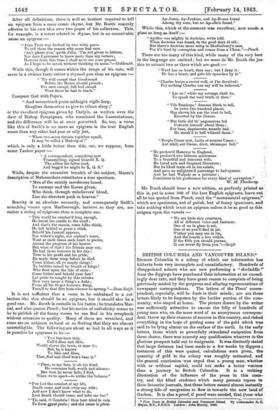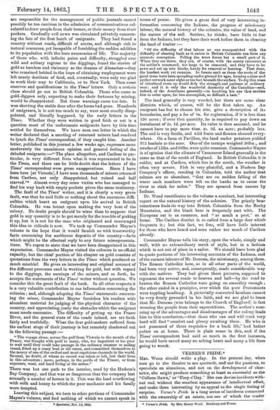BRITISH COLUMBIA AND VANCOUVER ISLAND.* BRITISH Columbia is a colony
of which our information has hitherto been very incomplete and unsatisfactory. Hundreds of disappointed miners who are now performing a " skedaddle " from the diggings have purchased their information at an exceed- ingly dear rate, and they have great reason to complain of being grievously misled by the gorgeous and alluring representations of newspaper correspondents. The letters of the Times' corres- pondent, especially, will be fresh in their minds ; nor are those letters likely to be forgotten by the luckier portion of the com- munity, who stayed at home. The picture drawn by the writer was sufficiently attractive to excuse the folly of hundreds of young men who, on the mere word of an anonymous correspon- dent, threw up their chances of success in this country, and risked everything in the hope of getting some of the gold which was said to be lying almost on the surface of the earth. In the early letters, those which so powerfully stimulated emigration from these shores, there was scarcely any qualification whatever in the glorious prospect held out to emigrants. It was distinctly stated that large fortunes had been made in a few weeks by diggers ; instances of this were quoted, calculations were given, the quantity of gold in the colony was roughly estimated, and the general conclusion was urged that a young man, whether with or without capital, could not make a better venture than a journey to British Columbia. It is a striking illustration of the influence of the press in this coun- try, and the blind credence which many persons repose in their favourite journals, that these letters caused almost instantly a strong tide of emigration to flow in towards the new land of Goshen. It is also a proof, if proof were needed, that 'those who ' Four Years in British Columbia and Vancouver Island. By Commander R. C. Mayne, R.N., F.R.G.S. London: John Murray. 1862.
are responsible for the management of public journals cannot possibly be too cautious in the admission of communications cal- culated to draw people from their homes, or their money from their pockets. Gradually evil news was circulated privately concern- ing the fate of the first batch of emigrants. They had found a country without roads, difficult of access, and although rich in natural resources, yet incapable of furnishing the sudden addition to its population with the bare necessaries of life. The majority of those who, with infinite pains and difficulty, struggled over wild and solitary regions to the diggings, found the stories of gold as baseless and visionary as the dreams of Alnaschar—they
who remained behind in the hope of obtaining employment were left nearly destitute of food, and, eventually, were only too glad to work their way to California, or to New York. Then came reserves and qualifications in the Times' letters. Only a certain class should go out to British Columbia. Those who came as gold-diggers only, expecting to make their fortunes by mining, would be disappointed. But these warnings came too late. It was shutting the stable door after theliorse had gone. Hundreds of emigrants, it is not too much to say, were most cruelly disap- pointed, and literally beggared, by the early letters in the Times. Whether they were written in good faith or not is a
question most of the unfortunate emigrants have by this time
settled for themselves. We have seen one letter in which the writer declared that a meeting of returned miners had resolved to lynch the Times' correspondent, if they caught him. Another letter, published in this journal a few weeks ago, expresses more moderately the unanimous opinion and general feeling of the deluded emigrants :—" The place altogether, and Cariboo in par- ticular, is very different from what it was represented to be in the Times, and there can be little doubt that the letters of the Times' correspondent were gross exaggerations. Since I have been here [at Victoria], I have seen thousands of miners returned from Cariboo, not only disappointed, but ruined and half starved."* Almost every day some victim who has managed to
find his way back with empty pockets gives the same testimony.
The fault of the Times' writer, and it is clearly a very grave fault, was that he said little or nothing about the enormous diffi- culties which beset an emigrant upon his arrival in British
Columbia. He was intent upon making the very best of the colony. No doubt people should "be wiser than to suppose that gold in any quantity is to be got merely for the trouble of picking
it up, but it is not for the man -who originated and encouraged this idea to ridicule it now. We took up Commander Ilayne's -volume in the hope that it would furnish us with trustworthy facts concerning the auriferous deposits of the country—facts which might be the effectual reply to any future misrepresenta- tions. We regret to state that we have been disappointed in this expectation. Commander Mayne visited the colonies in an official capacity, but the chief portion of his chapter on gold consists of quotations from the very letters in the Times which produced so much mischief. He gives an interesting and original account of the different processes used in -working for gold, but with regard to the diggings, the earnings of the miners, and so forth, he accepts the statements of the Times' writer without question. We consider this the great fault of the book. In all other respects it
is a very valuable contribution to our information concerning the
colonies ; and, although adopting the Times' statements concern- ing the mines, Commander Mayne furnishes his readers with
abundant material for judging of the physical character of the country, and appreciating justly the obstacles which the emigrant must needs encounter. The difficulty of getting up the Fraser River, and the general state of the roads inland, are set forth fairly and truthfully. What the first gold-seekers suffered from the earliest stage of their journey is but remotely shadowed out in the following passage :—
"The voyage alone, across the gulf from Victoria to the mouth of the Fraser, was fraught with peril to man,y, who, too impatient or too poor to wait until they could take passage m the ordinary steamer or sailing vessel, fitted up a crazy boat or old canoe, and committed themselves to the mercy of one of the swifest and most capricious channels in the world. Several, no doubt, of whom no record was taken or left, lost their lives in this adventure ; more, perhaps, in the perils of the Fraser, or from exposure, want, and bard living at the mines."
There was but one path to the interior, used by the Hudson's Bay Company, and that was so dangerous that the company lost annually a number of horses in it. This was the land overflowing with milk and honey to which the poor mechanic and his family were tempted.
Leaving this subject, we turn to other portions of Commander Mayne's volume, and find nothing of which we cannot speak in
• Spectator, Nov. 15, 1852.
terms of praise. He gives a great deal of very interesting in- formation concerning the Indians, the progress of missionary labour, the natural history of the colonies, the value of land, and
the nature of the soil. Settlers, he thinks, have little to fear
from the Indians, but they have their work before them in clearing the land of timber :-
"Of the difficulty of that labour no one unacquainted with the difficulty of clearing bush as it exists in British Columbia can form any accurate conception. Felling the trees forma but a small part of it. When they are down, they are, of course, with the scanty resources at the settler's command, too large to be removed, and they have to be sawn and cut up into blocks, handy for removal or burning. That done, the hardest work yet remains. In forests such as these the roots of the giant trees have been spreading under ground for ages, forming a close and perfect network some eight or ten feet beneath the surface. To dig this mass of interlaced roots up would defy the strength and patience of ordinary men ; and it is only the wonderful dexterity of the Canadian—and, indeed, of the Americans generally—in handling his axe that enables him to enter upon, far less accomplish, so difficult a task."
The land generally is very wooded, but there are some clear districts which, of course, will be the first taken up. An emigrant has but to choose his site, give a description of its boundaries, and pay a fee of Ss. for registration, if it is less than 150 acres ; if over that quantity, he is required to pay down an instalment of 2s. ld. per acre. Its value is then assessed, and he
cannot have to pay more than 4s. 2d. an acre; probably less. The soil is very fertile, and wild fruits and flowers abound every- where. On a farm at Pavillon, the land under potatoes yielded 375 bushels to the acre. One of the turnips weighed 261bs., and swedes of 151bs. and 16Ibs. were quite common. Commander Mayne is of opinion that the climate of Vancouver Island generally is the same as that of the south of England. In British Columbia it is colder, and at Cariboo, which lies in the north, the weather is
often very severe. Fish is very plentiful, and a Hudson Bay Company's officer, residing in Columbia, told the author that salmon are so abundant, "that are on sudden falling of the water such numbers were left on the banks as to cause the river to stink for miles." They are speared from canoes by
Indians.
Dr. Wood contributes to the volume a succinct, but interesting report on the natural history of the colonies. The grizzly bear sometimes finds its way into British Columbia from the Rocky Mountains, and the black bear is frequently met with. The European rat is as common, and "as much a pest," as at home. The Cariboo district is so called from a large deer which frequents it ; but this fact, we fear, will have little interest for those who have heard and seen rather too much of Cariboo already.
Commander Mayne tells his story, upon the whole, simply and well, with no extraordinary merit of style, but in a fashion which is not out of place in a sailor. We should have been glad to quote portions of his interesting accounts of the Indians, and of the earnest labours of Mr. Duncan, the missionary, among them. The Roman Catholics here, as in all other parts of the world, had been very active, and, consequently, made considerable way with the natives. They had given them pictures, supposed to represent the several roads to heaven and hell—by the road to heaven the Roman Catholics were going on smoothly enough ; the other ended in a precipice, over which the poor Protestants
were toppling headlong. A pictorially converted heathen cannot be very firmly grounde-1 in his faith, and we are glad to learn that Mr. Duncan (who belongs to the Church of England) is fast weaning the people from their superstitions. The author's sum- ming up of the advantages and disadvantages of the colony leads him to this conclusion,—that those who can and will work very hard will find "comfort and plenty awaiting them. He who is
not possessed of thOse requisites for a bush life," had better potter on at home. There is plain sense in this, and if the
Times' correspondent had said as much in the first instance, he would have saved many an aching heart and many a life from
going to wreck.































 Previous page
Previous page